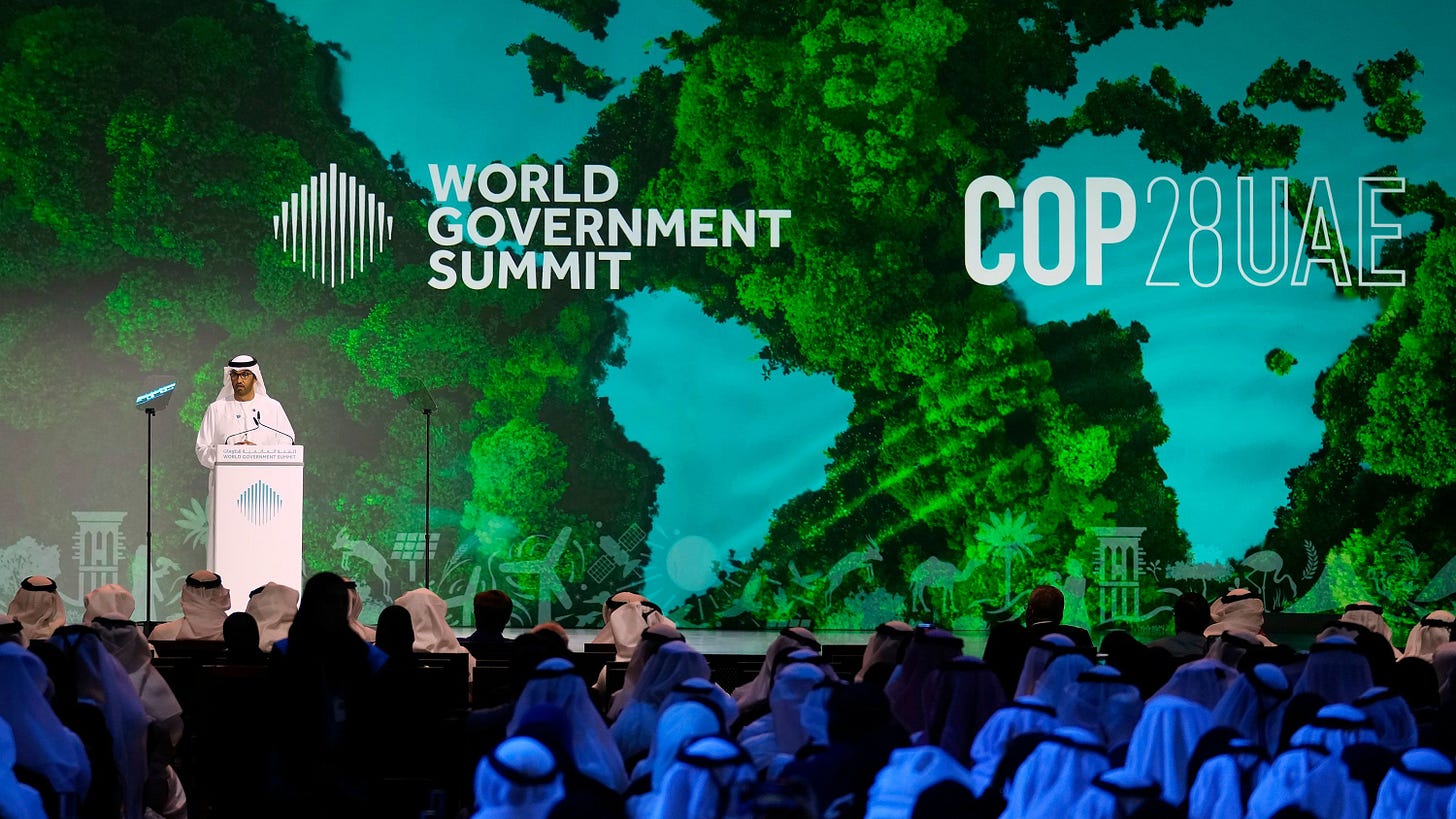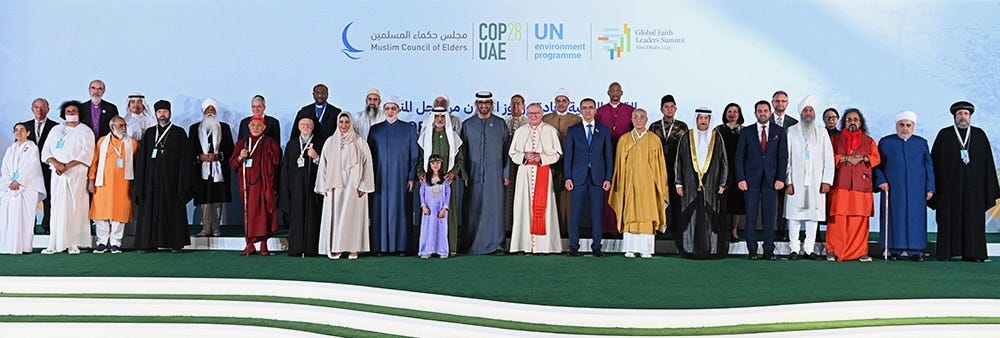Refugia Newsletter #56
COP 28, faith at COP 28, church-based food networks, and Greek puns in Luke 1
Refugia News
Classes at Calvin University concluded for the semester this week, so my role now shifts from Teacher to Grader. That’s OK: end-of-semester papers tend to be students’ best work, often full of delights, often evoking that surprising moment of “They learned something!” Calvin students are a diligent bunch.
Meanwhile, my role also shifts to Mediocre Church Musician. I get to play my viola quite a bit in the next few weeks to help out with various lovely choral concerts and church services. This season, for musicians, can be both wildly busy and also wonderful. I firmly believe that sacred Christmas music is the best. Still, I know of at least one pianist/organist and one trumpet player who are involved in so many events they must be flying around town on roller skates.
And of course, many of us turn into Frantic Elves as we manage gift-giving and family celebrations. Sometimes it all just feels like extra items on our task lists. However you might be celebrating this mid-winter season, I hope you will be able to claim a few sweet moments of joy, a few fleeting glimpses of transcendence and hope.
This will be my last full-length newsletter until January 6. I’ll send you something artful and simple on December 23, just to hold us over.
Meanwhile, I share this image that Ched Myers shared with me after our podcast discussion on Mark 13 and the “Little Apocalpyse.” Artist Elena Markova based the work on Isaiah 34:4, “All the stars in the sky will be dissolved and the heavens rolled up like a scroll.” Something about the image has haunted me ever since. The weary determination in the angel’s posture? The innocent creatures wondering what is going on? Not sure. But there’s some Advent ache in there.
For more, see Markova’s website.
This Week in Climate News
All other climate news recedes in the background as we face COP 28, the annual “Conference of the Parties” where representatives from almost 200 nations get together to haggle over how to address climate issues. The conference, in Dubai this year, gathers some 70,000 people (!). It began on November 30 and concludes, mercifully, on December 12.
So here we are, in the midst of it, and the news articles and podcasts have been pouring into my inbox over the past two weeks. I’ll try to summarize a few of the biggest tussles for you.
But first, a little history. If you are confused about COP and what it is and why it matters, I recommend listening to this episode of the Climate One podcast. The whole episode is worth your time, but around minute 21:00, host Greg Dalton interviews Daniel Esty, Professor of Environmental Law and Policy at Yale Law School. Esty has been involved with COP in various capacities since the 1992 Earth Summit in Rio. He gives a very helpful overview of the bumpy history, including some encouraging thoughts on genuine progress.
And now, a quick sum-up of the current headlines about this year’s COP.
Why him? You’ve surely read about how the president of COP this year is Sultan Ahmed Al-Jaber, who is also head of the United Arab Emirates state-owned oil giant, Adnoc. His supporters will be quick to point out that Adnoc has a renewable energy division, too, called Masdar. No one is fooled, though. Despite assiduous PR efforts on the part of Al-Jaber’s company, his appointment as president was controversial from the minute it was announced. But in fact, fossil fuels have always had a presence at COP. It’s just that the presence is getting more pervasive, dominating—and frustrating.
So many lobbyists. This year, in fact, the number of fossil fuel lobbyists at COP has hit an all-time high of about 2400, according to reporting by Grist. That’s about 1 of every 40 attendees. One of the reasons we even know this is that new transparency rules requires that attendees reveal all their associations. This is meant to unmask the little trick in which lobbyists show up under the guise of various trade associations and go about pushing for things like carbon offsets and carbon capture.
Revelations of shenanigans. Sure enough, fears that Al-Jaber would act on his obvious conflict of interest were well founded. Just before COP began, reporters got a hold of insider documents proving that Al-Jaber and his oil industry colleagues had specific plans for making fossil fuel development deals at COP. As Justin Rowlatt of BBC News reported, in deadpan understatement,
Attempting to do business deals during the COP process appears to be a serious breach of the standards of conduct expected of a COP president.
Are there official rules against this sort of thing? Why yes, there are. COP presidents, according to the UN organizing group, are “expected to act without bias, prejudice, favouritism, caprice, self-interest, preference or deference, strictly based on sound, independent and fair judgement.”
Bill McKibben’s newsletter offers the best summary of reporting (with links) on these insider documents, including those describing truly nefarious plans to shift fossil fuel development to more vulnerable markets in African countries. McKibben quotes Mohammed Adow:
“The Saudi government is like a drug dealer trying to get Africa hooked on its harmful product… The rest of the world is weaning itself off dirty and polluting fossil fuels and Saudi Arabia is getting desperate for more customers and is turning its sights on Africa. It’s repulsive.”
Image credit: africasciencenews.org
“No science.” The fun continued in the early days of COP when Al-Jaber said, on camera:
There is no science out there, or no scenario out there, that says the phaseout of fossil fuel is what’s going to achieve 1.5.
This, after patronizingly scolding Mary Robinson, former president of Ireland, for even asking the question of whether he would support a phase-out of fossil fuels.
Well! The good news is that you can’t get away with nonsense like that on a world stage without a backlash. And there was a backlash. This article by Lisa Friedman in the New York Times describes it well. Al-Jaber frantically tried to walk back what he said, pretend he didn’t say it, pretend he didn’t mean it, scramble to re-polish his image as an honest player in climate negotiations, etc. But sorry, buddy. We heard you. And we’re not surprised.
Want some science? Here you go. Emily Atkin of Heated rounded up some actual climatologists and asked them to bring the receipts.
“Unabated.” We’re not surprised about Al-Jaber’s remarks because we understand the fossil fuel industry playbook, which is to cast doubt, greenwash, and delay. Hence another word-based tussle at COP. What language will be used in the final agreement? Zoë Schlanger in The Atlantic sums up what’s at stake:
On Tuesday [Dec. 5], a draft text of a document that will guide all countries’ climate policies for the next several years was released …. In its section on fossil fuels, it listed three options:
Option 1: An orderly and just phase out of fossil fuels;
Option 2: Accelerating efforts towards phasing out unabated fossil fuels and to rapidly reducing their use so as to achieve net-zero CO2 in energy systems by or around mid-century;
Option 3: no text
After thirty years of these meetings, we are still trying for figure out: Can we actually say what needs to be said? Well, that would be Option 1, and 106 members states want it. Bob Berwyn of Inside Climate News reports:
Friday [Dec. 1], 106 countries—27 member states of the European Union and the 79 members of the Organisation of African, Caribbean and Pacific States—finally took the issue head on, calling for a fossil fuel phaseout, an immediate end to all new oil and gas production and clear end dates for fossil fuel production.
However, the big oil states—including the US—want that word “unabated” in there because it leaves the door open for continuing to burn fossil fuels and profit from development, all covered by the fig leaf of “abatement,” i.e., carbon capture and storage, technologies that are expensive, unproven, and so far unscalable. All in service of what HeatMap calls a “lucrative decline.” John Kerry, the US Special Climate Envoy, has just in the last day or so tried to soften the US stance, saying the US will “largely” support phasing out fossil fuels.
For more, here’s the New York Times article on this whole abatement issue. And here’s an article from Vox, which summarizes why abatement is not viable.
“Global stocktake.” That’s supposed to be one big outcome of COP: an answer to the question, “so… how are we doing in keeping average annual global temps to 1.5C over pre-industrial levels?” The answer will be “not enough, not fast enough.” As Greta Thunberg famously remarked, without actions, the tedious negotiations over statements and wording are all just “blah blah blah.” None of it is binding. Nevertheless, words are important and the symbolism, moral weight, and public accountability matters.
Deeper Dive
And now for some good news about COP 28: Faith leaders are more involved, organized, and visible than ever. In an unprecedented gathering, faith leaders from around the world met in Abu Dhabi November 6-7 for the Global Faith Leaders Summit, preparing for COP under the theme “Confluence Of Conscience: Uniting Faith Leaders For Planetary Resurgence.”
Image credit: Muslim Council of Elder, ncronline/earthbeat.org
While some 200 people gathered, a group of 28 leaders representing 19 faith traditions drafted a statement as a message to COP leaders and to the public. An excerpt:
We ardently implore all decision-makers assembled at COP28 to seize this decisive moment and to act with urgency, weaving a tapestry of shared action and profound responsibility. The urgency of the hour demands that we act swiftly, collaboratively, and resolutely to heal our wounded world and preserve the splendor of our common home.
I was surprised to learn that a robust, organized faith presence at COP is a relatively recent phenomenon. The Pope’s 2015 Laudato si’ seems to have been one catalyst for recent developments.
This year is also the first time there has been an official Faith Pavilion, a dedicated venue with 60 faith-related events.
In a press statement, UN Secretary General Antonio Guterres encouraged the leaders at the Confluence of Conscience summit and emphasized the importance of religious faith in moving the world toward a just transition:
We need your moral voice and spiritual authority to summon the conscience of leaders, awaken their ambition, and inspire them to do what is needed at COP28 to save our one and only home.
For more on faith at COP28, take a look at this webinar created by Catholic Climate Covenant and Laudato si’ Movement.
Refugia Sighting
Well, after all that sweepingly global business, we need to get back the local, the practical, the very dirt. So I am happy to share with you the work of Rev. Heber Brown III in Baltimore. Thanks to my friend Derrick Weston, host of the Green Lectionary Podcast, for teaching me about Rev. Brown and the Black Food Security Network, which we could describe as a whole refugia system.
Brown and his church have started a network of some 200 Black congregations who are engaged in creating local foodsheds for their communities either by working with nearby black farmers, creating church-run gardens, or both. It all started when Brown realized he was often visiting his parishioners in the hospital for diet-related health problems. To create systemic change, his church started growing their own produce, with a farmer’s market for churchgoers right after the service. One thing led to another, and now there’s a network of churches doing the same thing in their communities.
I highly recommend listening to this conversation between Rev. Brown and Rev. Jen Bailey. Besides explaining how the network started and how it works, Brown and Bailey speak movingly about the power of Black churches in working for social change and about the importance of healing Black Americans’ trauma connected with land.
For more, you can also read this 2020 interview with Rev. Brown by Amy Frykholm in the Christian Century.
And if you have a faith-ful foodie on your Christmas list, check out Derrick Weston’s new book with Anna Woofenden, The Just Kitchen.
The Wayback Machine
I’m surprised I’ve never shared this essay with you before, as it’s one of my favorites. You know how preachers sometimes say that they preach sermons they need to hear themselves? Well, the same is true of writers. This is an essay I wrote because I needed it myself. Still do. It’s about the Visitation story in Luke 1 and the power of the Word of God to enter into history, into all those hidden and unlikely places where we have given up hope. This is where the Word of God sweeps in. I offer the essay as my Advent gift to you.
So the word comes to Zechariah, and Zechariah is silenced, and then a child is generated within Elizabeth. The righteousness of this faithful couple does not cause this marvel, nor do old age and barrenness prevent it. And then the word comes to Mary, and a child is generated within her. Her humility and purity do not cause this miracle, nor does her virginity prevent it. Because, as Gabriel says, “nothing is impossible with God.” A more exact translation would be: “Not shall-be-unable before God every utterance.” The utterances of God must bring forth their purpose; there is simply no option. In the Old Testament idiom, God’s words do not “fall to the ground.” They sweep in, irresistible.
I do hope the babies turn before delivery, or Elizabeth and Mary will both be dealing with breech births.
May you experience the power of God this season in exactly those places where change and hope seem most impossible. May the utterances of God bring forth holy purposes in your life and in this world.
Peace to you. Until next time, be well.
(As always, all bold emphasis in quotations is added unless otherwise indicated.)









